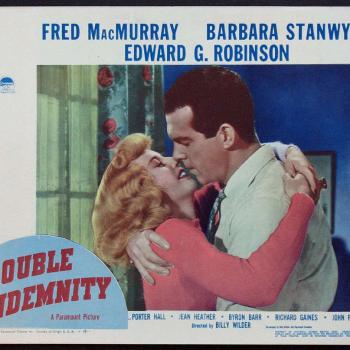I would be remiss (or at least very unlike myself) if I didn’t throw in a little Lacan (or in this case, Žižek, a Lacanian), for whom language is central to how the world works:
We feel free because we lack the very language to articulate our unfreedom. (Welcome to the Desert of the Real)
The Medium here is not the message, quite the opposite: the very medium that we use- the universal intersubjectivity of language-undermines the message. (Less Than Nothing)
In the latter quote, his point goes even a bit further than I have: that language, insofar as it brings with it all sorts of unintended connotations and imprecisions, basically “gets in the way.”
One could cite Heidegger and Gadamer on technology and science respectively to push home the point: how we speak limits our perspectives; the languages we inherit define the terms we put to use.
I haven’t meant to seem glib or condescending. There are some people who might simply refuse to acknowledge that anything beyond ill-defined common sense ought to shape the language we use. In a way, this argument boils down to “if it already exists in language, it’s good enough.”
Most opponents of some of our current cultural turn, however, might be more likely to take an Orwellian tack: the policing of language is itself a form of thought policing. They might say “of course language matters! That’s why I’m standing up for it!” This seems reasonable enough, except that it risks falling into precisely the fallacy outline above: that how we speak is, in some fundamental sense, already correct.
Let me be plain: I recognize that there are lots of, from my perspective anyway, bad or misguided changes to language. I work in academia, the notorious home of jargon. I can’t say I see much good in the linguistic tinkering of certain Swedish Christians. There are good and bad ways to think and enact linguistic (and thus broader) change. But too often all change is resisted as necessarily horrid. The term “microaggressions” is used to dismiss what might actually be the residual effects of this country’s storied history of slavery (e.g. a person crossing the street because a young, black man is on the same side of the sidewalk. One might chock this up to a feeling of insecurity, of possible danger. But then one could ask why such a person, what he was wearing, etc., that is, what he represents. This could be said, for that person, to read as “dangerous.” The legacy of Reconstruction and the fact of generational poverty might come up, leading to thoughts about how words like, say, “thug,” do exert some influence on how we conceive of black poverty). A more banal (and, frankly, sillier) example might be atheists calling God a sort of “magic sky fairy.” Anyone who understands anything beyond the most base theism can see that this is a ludicrous accusation, and yet if it gets repeated enough, it will surely affect how people conceive of believers. We put a good deal of effort into attacking such language: why not give a hearing to those who want us to understand why specific groups might feel attacked by x, y, or z term?
To end, I think it best to clarify. Here I have not been interested in legal questions. My interest has merely been to demonstrate that if people (and here I address many “conservatives”) admit language matters, they ought to give a better hearing to how and why others feel it does. Further, I’d like to be clear that many groups do go too far; I don’t intend to endorse every linguistic change ever proffered. But I do intend to highlight the inescapability of language and why more of us ought to be taking it seriously.
Perhaps if we reframed many of our debates around freedom of speech as debates about language and its meaningfulness in shaping personal and social views, we’d be a step closer to getting somewhere (it’s clear enough to me that “free speech” means far too many different things to different people). The legal and political questions might arrive a bit easier if we actually recognized what we all already agree on, in a sense, what we’re fighting for and what’s worth keeping in mind when addressing an “opponent”: language matters.













